Top 457 Globalization Quotes & Sayings
Explore popular Globalization quotes.
Last updated on December 21, 2024.
Is Islam a tribe or is it a force of globalization? Islam has certainly been studied as a local, tribalistic phenomenon. But Islam is also theoretically a universalist idea, its spread has been facilitated by modern technologies, and it's an identity that people can slip into and out of fairly easily. I don't think Islam has really been understood as a product of globalization. It might be one of these instances where globalism and tribalism ultimately go hand in hand.
While you can say that the problem of the middle class in the rich countries is too much globalization, the problem of the people who are very poor is really that they are not included in globalization. For them, the success of their own countries at becoming part of this international division of labor would be good news.
The 1 to 2 billion poorest in the world, who don't have food for the day, suffer from the worst disease: globalization deficiency. The way globalization is occurring could be much better, but the worst thing is not being part of it. For those people, we need to support good civil societies and governments.
The term "globalization," like most terms of public discourse, has two meanings: its literal meaning, and a technical sense used for doctrinal purposes. In its literal sense, "globalization" means international integration. Its strongest proponents since its origins have been the workers movements and the left , which is why unions are called "internationals", and the strongest proponents today are those who meet annually in the World Social Forum and its many regional offshoots.
Globalization has considerably accelerated in recent years following the dizzying expansion of communications and transport and the equally stupefying transnational mergers of capital. We must not confuse globalization with "internationalism" though. We know that the human condition is universal, that we share similar passions, fears, needs and dreams, but this has nothing to do with the "rubbing out" of national borders as a result of unrestricted capital movements. One thing is the free movement of peoples, the other of money.
Globalization has become an ideology with no constraints. And now, nations are forcing themselves back into the debate. Nations with borders we control, with people that we listen to, with real economies, not Wall Street economies, but rather factories and farmers. And this goes against this unregulated globalization, wild, savage globalization.
Those negatively affected by globalization, those who are losing their jobs, and losing their skills, people out of training, must be looked after. Governments must establish policies, and governments and companies must actually address that issue, so that those who lose out from globalization can be retrained, recycled, re-established, cared for.
What is true, and I think that we can't deny it, is that some of the same concerns about globalization, about technology, rapid social change that were reflected in Brexit, that's been reflected in some of the debates in Germany and France and other places, that those exist in the United States as well. My view is that over the long term, over the next 10, 15, 20 years, if we are able to address the legitimate economic concerns of those who feel left behind by globalization, then many of these tensions will be reduced. And we will see a world that is less divided.
The Globalization of humanity is a natural, biological, evolutionary process. Yet we face an enormous crisis because the most central and important aspect of globalization-its economy-is currently being organized in a manner that so gravely violates the fundamental principles by which healthy living systems are organized that it threatens the demise of our whole civilization.
I think the twenty-first century happened, basically. That this century started on 9/11. And basically, it's been a century of counter reaction to globalization and the meritocracy. And a good century for 72 nations have gotten more authoritarian. We've had Brexit. We have Le Pen rising in France. We've just got a lot of these types all around the world. And the people who are suffering from globalization and the meritocracy are saying, "No more. You know, we get a voice too."
We draw many benefits from globalization that people take for granted. Poverty has been reduced massively around the world. If you look at the Chinese numbers, it is quite mind-boggling: 700 million people taken out of poverty in a matter of 40 years, the poverty rate having moved from over 30 per cent from hardly six per cent now. That would not have happened if there had not been globalization.
...As the disparity between the rich and the poor grows, the fight to corner resources is intensifying. To push through their "sweetheart deals," to corporatize the crops we grow, the water we drink, the air we breathe, and the dreams we dream, corporate globalization needs an international confederation of loyal, corrupt, authoritarian governments in poorer countries to push through unpopular reforms and quell the mutinies. Corporate Globalization-or shall we call it by its name?-Imperialism-needs a press that pretends to be free. It needs courts that pretend to dispense justice.
I think that the movement against the World Bank, against the globalization process that is happening, is very positive. We need a globalization, a globalization of people who are committed to social justice, to economic justice. We need a globalization of people who are committed to saving this earth, to making sure that the water is drinkable, that the air is breathable.
Most of the time the concept of globalization ends up sounding unnecessarily abstruse - even the name itself sounds clunky and highfalutin. And people discuss it in a way that makes it seem so impersonal. But globalization really is a concrete, fundamental fact in everybody's lives, and you really see that come to life in soccer stadiums.
In Globalization 1.0, which began around 1492, the world went from size large to size medium. In Globalization 2.0, the era that introduced us to multinational companies, it went from size medium to size small. And then around 2000 came Globalization 3.0, in which the world went from being small to tiny.
Especially now, the immigrant problem is very dramatic around the world. Because we don't know what to do with them. They're in economic crisis, and there are more and more. There will be more and more. We speak about globalization of economy, but it's also globalization for immigration. Millions of people, they're willing to have a better life. A better life, they cannot have it where they live, so they move.
Globalization is a bottom-up phenomenon with all actions initiated by milions of individuals, the sum total of which is globalization. No one is in charge, and no one can anticipate what the sum of all the individual initiatives will be before the result manifest. A global economy can only be the result of spontaneous order.














































